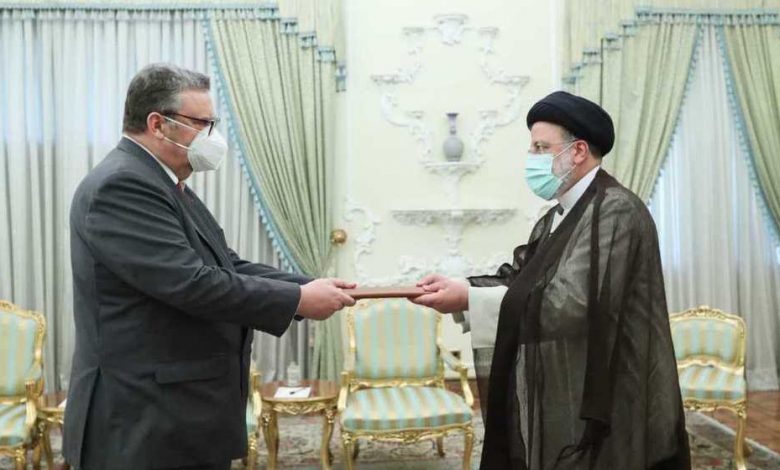
Raeisi made the remarks in a Monday meeting with the new Finnish ambassador to Iran, Kari Kahiluoto, who presented his credentials to the Iranian president.
“We hope that the European Union and [other] European countries would move toward [achieving] strategic independence and distance themselves from the expansionist policies of the United States, because US unilateralism does not benefit the world,” Iran’s president said.
He urged Europe to remain committed to its obligations to Iran, expressing hope that Tehran and Helsinki would witness the expansion of ties during the new ambassador’s mission and as the two countries approach the 90th anniversary of the establishment of their relations.
Kahiluoto, for his part, said Iran plays a key role in the region, adding that Finland is keen to cooperate with Tehran on regional issues, such as the ongoing developments in Afghanistan.
He noted that Finland had made good investments in Iran in the past and is now willing for the two countries to return to the same level of relations.
Raeisi: Europeans failed to fulfill their commitments under JCPOA
In another meeting with new Belgian Ambassador to Tehran Gianmarco Rizzo on Monday, Iran’s president took European countries to task for failing to fulfill the obligations they had undertaken under a 2015 nuclear deal with Iran, saying that they should not turn Europe into US’ sphere of influence.
He added that Iran has always been committed to its obligations as per the nuclear deal, officially known as the Joint Comprehensive Plan of Action (JCPOA), but the European signatories to the agreement — Britain, France and Germany — had failed to live up to their obligations.
“European countries, whether regarding the JCPOA or with respect to other issues, should not act in such a way that the US would believe Europe is its sphere of influence,” Raeisi stated.
He added, “The United States seeks to spread and impose its oppressive will on the world, but other countries should not allow the US to continue its unilateralism and inroads into different parts of the world.”
The JCPOA was originally reached between Iran and the P5+1 group of countries — the United States, the UK, France, Russia, and China plus Germany — in Vienna on July 14, 2015. It lifted nuclear-related sanctions against Iran in exchange for the Islamic Republic enforcing some voluntary restrictions on its peaceful nuclear energy program.
However, the US left the JCPOA under former President Donald Trump in 2018 and reimposed cruel sanctions as part of its policy of “maximum pressure” targeting the Islamic Republic. Its European allies in the agreement bowed down to the American pressure and started to toe the sanctions line as closely as possible.
Iran strictly fulfilled its nuclear undertakings under the 2015 nuclear deal, as certified repeatedly by the International Atomic Energy Agency (IAEA), even for a year after the US nixed it, giving the other parties ample time to salvage the deal. However, due to the sanctions and the non-compliance of the other parties, not least the Europeans, Tehran began to go beyond some of the limits put on its nuclear work starting on May 8, 2018.
Iran and the remaining parties to JCPOA have held six rounds of talks in Vienna, which began after the US administration of Joe Biden voiced willingness to rejoin the nuclear agreement.
While disagreements on key issues persisted, the participants took a break from the talks after Raeisi emerged victorious in Iran’s June presidential election, and waited for Iran’s democratic transition to take place to continue the talks.
Raeisi told the new Belgian ambassador that Tehran is keen to broaden cooperation with Brussels in trade and economic fields, but emphasized that the two sides should not “allow outsiders to affect these relations.”
Rizzo, for his turn, pointed to cordial relations between the two countries, and expressed hope the two nations would further improve economic cooperation.







